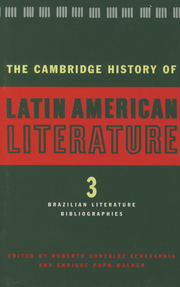Book contents
- Frontmatter
- Introduction to Volume 3
- 1 The literary historiography of Brazil
- 2 Colonial Brazilian literature
- 3 Brazilian poetry from the 1830s to the 1880s
- 4 Brazilian poetry from 1878 to 1902
- 5 The Brazilian theatre up to 1900
- 6 Brazilian fiction from 1800 to 1855
- 7 The Brazilian novel from 1850 to 1900
- 8 Brazilian fiction from 1900 to 1945
- 9 Brazilian prose from 1940 to 1980
- 10 The Brazilian short story
- 11 Brazilian poetry from 1900 to 1922
- 12 Brazilian poetry from Modernism to the 1990s
- 13 The Brazilian theatre in the twentieth century
- 14 Brazilian popular literature (the literatura de cordel)
- 15 Literary criticism in Brazil
- 16 The essay: architects of Brazilian national identity
- 17 The Brazilian and the Spanish American literary traditions: a contrastive view
- Bibliography
- Index
- References
15 - Literary criticism in Brazil
Published online by Cambridge University Press: 28 March 2008
- Frontmatter
- Introduction to Volume 3
- 1 The literary historiography of Brazil
- 2 Colonial Brazilian literature
- 3 Brazilian poetry from the 1830s to the 1880s
- 4 Brazilian poetry from 1878 to 1902
- 5 The Brazilian theatre up to 1900
- 6 Brazilian fiction from 1800 to 1855
- 7 The Brazilian novel from 1850 to 1900
- 8 Brazilian fiction from 1900 to 1945
- 9 Brazilian prose from 1940 to 1980
- 10 The Brazilian short story
- 11 Brazilian poetry from 1900 to 1922
- 12 Brazilian poetry from Modernism to the 1990s
- 13 The Brazilian theatre in the twentieth century
- 14 Brazilian popular literature (the literatura de cordel)
- 15 Literary criticism in Brazil
- 16 The essay: architects of Brazilian national identity
- 17 The Brazilian and the Spanish American literary traditions: a contrastive view
- Bibliography
- Index
- References
Summary
The practice of literary criticism in Brazil is characterized historically by the high quality and vitality of critical debate and its importance to national literary, intellectual, cultural, and political life. A progressive development of critical self-awareness is interconnected with foundations and concepts of national history and culture. Dependent on literary creation, on one hand, and archival or legal documents, on the other, critical writing forms a strong and prolific tradition, recently documented in Wilson Martins’s two-volume history of Brazilian literary criticism (A critica literdria no Brasil) and six-volume history of the Brazilian intelligentsia (História da inteligência brasileira), and further described in a wide bibliography of essays on the nature and theory of criticism in Brazil. Cosmopolitan thinkers in a South American context, exemplary founding figures of criticism from the nineteenth century established parameters of intellectual debate, from agnostic and revolutionary to orthodox and traditional, that to a great extent continue to shape the contemporary interchange of critical ideas. The continuing broad social and intellectual influence of critical debate today can be inferred from its prominence in journalistic literary supplements and its continuing relevance to national issues, as well as its growing role in universities and research.
Historical approaches to Brazilian criticism traditionally emphasize exemplary figures and fundamental texts within a chronological framework. Writings of major figures in criticism, starting in the nineteenth century from the Romantics to Silvio Romero (1851–1914) and Araripe Júnior (1848–1911), can be read both chronologically, drawing on their relationships with literary movements and periods, and thematically, following the evolution and development of their philosophical foundations.
- Type
- Chapter
- Information
- The Cambridge History of Latin American Literature , pp. 329 - 344Publisher: Cambridge University PressPrint publication year: 1996
References
- 1
- Cited by

